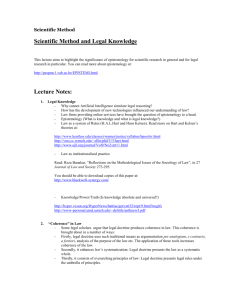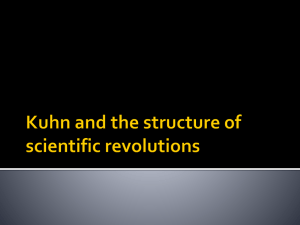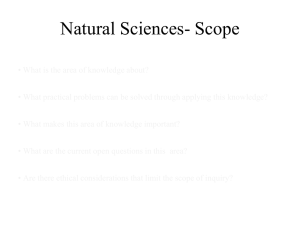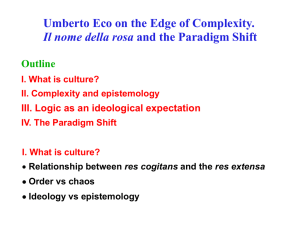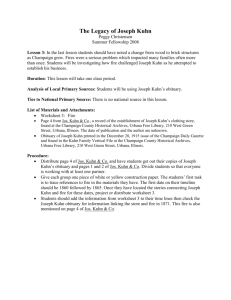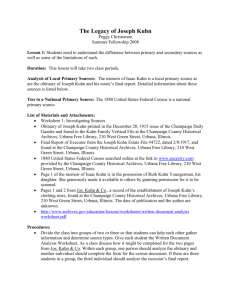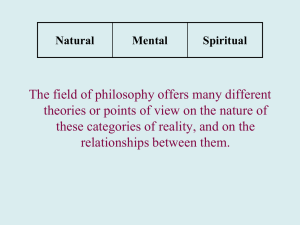Naturalized Epistemology
advertisement
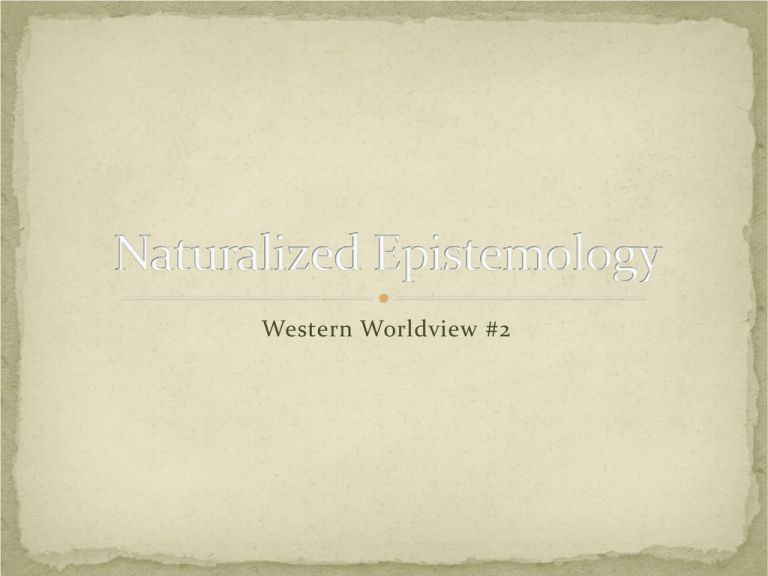
Western Worldview #2 When we ‘naturalize’ something we bring it into the realm of space and time. Approaches to human knowledge that emphasize abstract, necessary principles (Descartes, Locke, Berkeley, Hume, for example) lead to skepticism that undercuts empirical science (science about things and events in space and time … notably, things like scientific studies of our cognitive abilities). … like: ‘to know something, you must be able to preclude all possible alternative facts that might supplant the fact you assert in your knowledge claim’ To employ empirical science as a means to study knowledge would seem to be illicit. Naturalizing epistemology then is a controversial way of reacting to skepticism. 2 Kuhn (1905-1980) 1900 Goldman (1938- ) 2000 1950 America Quine (1908 – 2000) Naturalized Epistemology 3 Willard Van Orman Quine suggested the prudent thing to do in the face of skepticism is give in: The stimulation of his sensory receptors is all the evidence anybody has had to go on, ultimately, in arriving at his picture of the world. Why not just see how this construction really proceeds? Why not settle for psychology? -Quine Stanford.edu 4 How would such an enterprise proceed? Belief in God: Freudian wish-fulfillment? Marxist cognitive dysfunction? Belief in other minds: child psychology. Belief in external world: child psychology, object permanence experiments, so on. Whether any of these beliefs are true, or justified, or warranted, or otherwise known doesn’t or needn’t be considered. How the beliefs arise is the central concern. 5 Epistemology as Descartes, Locke, Berkeley, Hume and Kant conceived it, tries to understand how our experiences ground our common sense beliefs about ourselves, others, the external world (OOE). But if we naturalize epistemology, instead we will be studying the causes of belief formation. Instead of looking for good reasons for OOE beliefs, we’ll be looking at how OOE beliefs arise. Consider how this response to skepticism is very like phenomenology’s. Instead of meeting the challenge head on, the move is to limit philosophy to description of causes of experience (science) description of first-person experience (phenomenology) Is such a thing even epistemology? 6 Quine’s view has been criticized as circular: We can’t answer those skeptical about the physical world, say, with science … science presumes veridical experience to do experiments! Quinian answer: Right. Stop trying! Stop trying to know everything from a first-person perspective. You’re a human animal with language to communicate. Join the community of the curious! Do science! 7 Quine thought of epistemology as part of psychology. But he also held epistemology in a sense ‘contains’ the rest of science. In that way, epistemology and science are mutually constraining. See ‘Quine’ in IEP 8 Just as explanation seeps into Phenomenology and Existentialism, it also seeps into Naturalized Epistemology. In 1967 Alvin Goldman wrote The Causal Theory of Knowing. In that work he presents his view of Epistemic Reliabilism. Rather than simply recording or describing how our beliefs arise, naturalized epistemology is pulled into issues of justification (questions about true belief, good reasons for believing something, what do we know and how confident can we be about various things). 9 Consider A. The lights are on B. My folks are home The old view was, A justifies B because the person reasoning this way remembers that A has led to B regularly. But, because of skepticism, relying on internal facts like memory is no good. The new view is, A justifies B because the person reasoning this way is relying on a reliable process. Now, because of skepticism, relying on external facts like statistical correlations is required. 10 Consider A. The lights are on B. My folks are home So, on externalism, a person is justified in believing B based on A when a reliable process caused her to believe B when she considered A. Questions for Goldman: Does she need to know what the reliable process is? Does she need to know the process is reliable? Does she need to know the reliable process was established by a reliable process? 11 Consider A. The lights are on B. My folks are home For Goldman, the answer to all those questions is, no. But, this is just what you would expect if you think epistemology should be wedded to science. Science tells our parent predictor whether her beliefs are formed reliably. It is up to science to discover whether her psychological processes are reliable, and so whether she knows or is justified in believing something. Science will examine: memory (researchers trust their own memories to test the memories of others, whom they assume exist) inductive reasoning (researchers test the reliability of predictions, relying on their own memories and predictions of others, whom they assume exist) and so on… How might a process be unreliable? Consider: T. Gandii 12 Internalism, the view that justification must depend on things inside the knower, is still popular, despite skepticism arising and residing there. Externalism, the view that justification must include some reliance on things outside the knower, has been very popular lately. Externalism faces a great number of problems, but the main problems hearkens back to the insistence of internalism, that knowers understand how they know what they know. 13 Thomas Kuhn argues that the traditional conception of science as a piecemeal approach to understanding the world by theorizing, hypothesizing, testing, and rejecting or tentatively accepting theories is only partially correct. In The Structure of Scientific Revolutions, Kuhn argues that social science sheds light on how science really proceeds. Think of how skepticism shows that things as simple as “I see a tree” can be explained by: physical world paradigm (causal theory of perception) ideal world paradigm (divine occasionalism) the Matrix paradigm *Not thrilled with my account of Kuhn; we may skip slides 14-17 The data science studies can be interpreted in various ways, and which paradigm (Kuhn’s term for the reigning interpretive system) is accepted depends on how much it explains, how well it explains, and how severe and numerous its problem are). See ‘Kuhn’ in IEP 14 Kuhn looks at the change from the Ptolemaic system of astronomy to the Heliocentric system. Rather than being rejected due to some new evidence, or accumulation of evidence, the change to a new paradigm occurs by reinterpreting the data. Think of how on the Ptolemaic system, the sun is orbiting the earth, but on the Heliocentric system, the earth is orbiting the sun. Notice how the paradigm shift changes the subject from how to explain the sun’s orbit of the earth, to how to explain the earth’s orbit of the sun. *Not thrilled with my account of Kuhn; we may skip slides 14-17 One problem replace by another. It’s not that one problem is solved by new evidence. Instead there is a wholesale rejection of a system of thought and its replacement with another. 15 Consider again the statement from slide 14: The data science studies can be interpreted in various ways, and which paradigm is accepted depends on how much it explains, how well it explains, and how severe and numerous its problem are. *Not thrilled with my account of Kuhn; we 1. determine what will and will not count as data (you call archaeopteryx a transitional fossil?!… it is plainly a true bird!), and may skip they slides 14-17 2. determine the importance of data (archaeopteryx will revolutionize our understanding of birds! … you can’t still think it’s just an extinct modern bird!?). This is a bit misleading because Kuhn does not think paradigms change due to data or evidence, because paradigms: What does issue in changes of paradigms for Kuhn? Social and political forces. 16 How does Kuhn respond to skepticism about ourselves, others, and the external world? Evaluation of first-person knowledge claims is a mistake. What can be evaluated is systems of thought and their fit to data (remembering that those systems also determine in large part what counts as the data). *Not thrilled with my account of Kuhn; we may skip slides 14-17 Which system of thought is chosen is substantially arbitrary, and motivated more by social and political concerns, than reason, logic, or evidence. 17 All philosopher photos from Google Images. Search on philosopher’s name. 18


